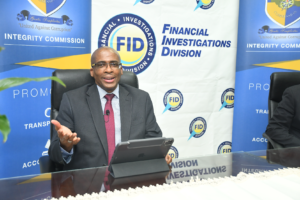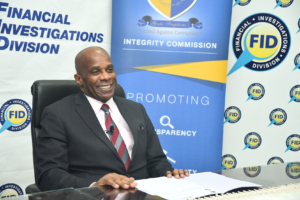
FID’s Chief Technical Director Selvin Hay and the IC’s Executive Director Greg Christie (seated left and right respectively) sign a Memorandum of Understanding under the guidance of FID’s Director of Legal Services Courtney Smith (left) and the IC’s Programme Coordinator Shellyanne Lutas.
The Integrity Commission and the Financial Investigations Division (FID) today signed a Memorandum of Understanding (MoU) aimed at strengthening both organisations’ response to, among other things, (public) corruption, money laundering, organised crime, fraud and financial crime. The MoU was signed by the Integrity Commission’s Executive Director Greg Christie and the FID’s Chief Technical Director Selvin Hay and during an event staged at the FID’s offices.
The MOU is aimed at fostering a strategic working relationship in which information-sharing lies at its core. This will bolster the Integrity Commission’s and the FID’s joint and/or separate criminal investigations; it assists both organisations in carrying out their respective statutory mandates, powers and responsibilities.
Under this MoU the Integrity Commission and the FID will provide each other with intelligence in the form of analysis, financial profiles or documents/reports related to the investigation of corruption, organised crime, financial crime and related activities.
FID’s Chief Technical Director Selvin Hay said, “Under this MOU, the Integrity Commission and the FID will provide each other with valuable information and other inputs necessary for meaningful case development and successful outcomes. It establishes clear objectives and guidelines and formally expresses our aligned will and demonstrates our collective commitment and will definitely provide opportunities for capacity building.

FID’s Chief Technical Director Selvin Hay
That is why partnering with the Integrity Commission in this way, is important to Jamaica’s Anti-Money Laundering (AML) and Anti-Corruption effort. It signals to the country that wherever acts of corruption and money laundering occur, the country’s law enforcement and anti-corruption agencies are ready to act.
The FID is always prepared to conduct financial investigations in the public and private sectors, then contribute to evidence-based prosecutions in the courts. This strategic partnership will fortify the FID’s ability in helping to protect the integrity of the financial system against abuse by criminals.”
He added, “Having identified the risks to which Jamaica is exposed, as a result of corruption and financial crimes, the country must continue to strengthen and implement measures that mitigate these risks. This MoU is another important step in achieving this objective. It is mutually beneficial and formalises our collaboration as we strive to tackle these scourges and, thereby depriving criminals in any sector from benefitting from their ill-gotten gains.”
Meanwhile, Integrity Commission’s Executive Director Greg Christie noted, “the MOU will strengthen the capacity of the IC’s Information and Complaints Division to access and utilize information from third party sources to assist it in its interrogation, verification and certification of the statutory declarations of public officials. This will include information on assets that are owned by declarants in foreign jurisdictions, as well as information on their involvement in suspicious transactions or activities.

Integrity Commission’s Executive Director Greg Christie
This MoU provides another major area of collaboration – tackling organised crime. It is no secret that Jamaica has been long plagued by this malady – a malady which has corruption at its very root! Organized crime in Jamaica is so grave that the World Economic Forum, in its highly respected and widely published annual Global Competitiveness Report, in October 2019, ranked Jamaica at #7, out of 141 countries, on the problem of organized crime.
Organized crime, if it is allowed to operate unchecked, will produce grave and irreparable consequences for any nation state. It will not only undermine the rule of law, but its tentacles will have the potential to infiltrate and subvert even the highest institutions of our state.
To tackle corruption and organized crime in Jamaica will, therefore, necessarily require a coordinated effort among all key stakeholders, particularly anti-corruption agencies such as the IC and the FID.”



